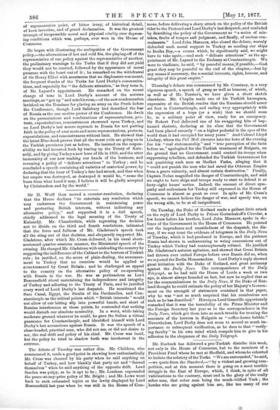Thursday's debate was commenced by Mr. Courtney, in a very
vigorous speech, a speech of grasp as well as humour, of which, as well as of Mr. Forster's, we have given a short sketch elsewhere. Mr. Chaplin made one of his Turkish harangues, expressive of the British resolve that the Russians should never set foot in Constantinople, and ending very appropriately with the expression of a hope (or a wish) that we should soon be, in a military point of view, ready for an emergency. Sir Robert Peel delivered one of his swaggering bits of hap- hazard rhetoric, declaring at its close that the Government had been placed recently " on a higher pedestal in the eyes of the world than it had occupied for many years." And Colonel Lloyd Lindsay, whom the Pall Mall elevates into the hero of the evening for his " real statesmanship " and " true perception of the facts before us," apologised for the Turkish treatment of Bulgaria, on the ground that no Government could control its troops when suppressing rebellion, and defended the Turkish Government for not punishing such men as Shefket Pasha, alleging that it " could not punish the men who had saved the Ottoman Empire from a grave calamity, and almost certain destruction." Finally, Captain Nolan magnified the danger of Constantinople, and said we ought to have ships and troops ready to start to defend it at forty-eight hours' notice. Indeed, the amount of direct sym- pathy and enthusiasm for Turkey still expressed in the House of Commons is almost as great as ever. In spite of Mr. Cross's speech, we cannot believe the danger of war, and speedy war, on the wrong side, to be at all insignificant.


































 Previous page
Previous page